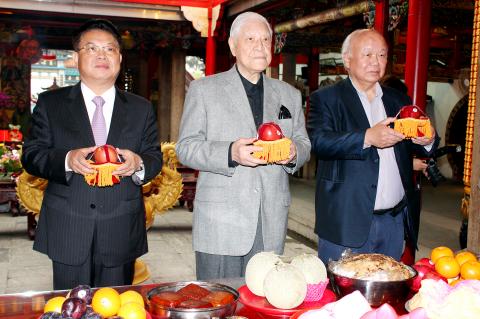Control Yuan President Wang Chien-shien yesterday made a caustic retort to former president Lee Teng-hui’s (李登輝) response over a recent spat stemming from a Control Yuan report regarding Lee’s parentage, saying: “We are all sinners,” including Lee.
On Wednesday, when asked about his reaction to a Control Yuan report that quoted an academic as saying that Lee could be the illegitimate child of a Japanese man, Lee said there was no point in getting himself worked up because “Taiwan’s future is more important to me than things like this.”
Lee said he would instead “pray to God to forgive their sins and stupidity.”

Photo: Huang Mei-chu, Taipei Times
Wang said on Tuesday that the Control Yuan report “was like firing a cannon at a bird,” and that “a bad bird deserved it.”
In response to media queries about Lee’s comments on Wednesday, Wang said he found what Lee said about the matter “very useful.”
“Pray for God’s forgiveness for all sinners. All people, including Lee Teng-hui, should think about whether they need to ask for forgiveness. Everyone has sinned, no matter how big or small they are. People who repent of their sins please God,” Wang said.
The report was completed by Control Yuan members Chou Yang-shan (周陽山) and Lee Ping-nan (李炳南) after they conducted an investigation into the preservation of documents related to the 228 Incident in 1947. The incident was an uprising against the then-Chinese Nationalist Party (KMT) regime.
Critics of the report accused the Control Yuan of focusing on issues that are not related to its functions, instead of acting as a government watchdog.

MAKING WAVES: China’s maritime militia could become a nontraditional threat in war, clogging up shipping lanes to prevent US or Japanese intervention, a report said About 1,900 Chinese ships flying flags of convenience and fishing vessels that participated in China’s military exercises around Taiwan last month and in January last year have been listed for monitoring, Coast Guard Administration (CGA) Deputy Director-General Hsieh Ching-chin (謝慶欽) said yesterday. Following amendments to the Commercial Port Act (商港法) and the Law of Ships (船舶法) last month, the CGA can designate possible berthing areas or deny ports of call for vessels suspected of loitering around areas where undersea cables can be accessed, Oceans Affairs Council Minister Kuan Bi-ling (管碧玲) said. The list of suspected ships, originally 300, had risen to about

DAREDEVIL: Honnold said it had always been a dream of his to climb Taipei 101, while a Netflix producer said the skyscraper was ‘a real icon of this country’ US climber Alex Honnold yesterday took on Taiwan’s tallest building, becoming the first person to scale Taipei 101 without a rope, harness or safety net. Hundreds of spectators gathered at the base of the 101-story skyscraper to watch Honnold, 40, embark on his daredevil feat, which was also broadcast live on Netflix. Dressed in a red T-shirt and yellow custom-made climbing shoes, Honnold swiftly moved up the southeast face of the glass and steel building. At one point, he stepped onto a platform midway up to wave down at fans and onlookers who were taking photos. People watching from inside

Japan’s strategic alliance with the US would collapse if Tokyo were to turn away from a conflict in Taiwan, Japanese Prime Minister Sanae Takaichi said yesterday, but distanced herself from previous comments that suggested a possible military response in such an event. Takaichi expressed her latest views on a nationally broadcast TV program late on Monday, where an opposition party leader criticized her for igniting tensions with China with the earlier remarks. Ties between Japan and China have sunk to the worst level in years after Takaichi said in November that a hypothetical Chinese attack on Taiwan could bring about a Japanese

STREAMLINED: The dedicated funding would allow the US to transfer equipment to Taiwan when needed and order upgraded replacements for stockpiles, a source said The US House of Representatives on Thursday passed a defense appropriations bill totaling US$838.7 billion, of which US$1 billion is to be allocated to reinforcing security cooperation with Taiwan and US$150 million to replace defense articles provided to the nation. These are part of the Consolidated Appropriation Act, which the US House yesterday passed with 341 votes in favor and 88 against. The act must be passed by the US Senate before Friday next week to avoid another government shutdown. The US House Committee on Appropriations on Monday unveiled the act, saying that it allocates US$1 billion for the Taiwan Security Cooperation Initiative